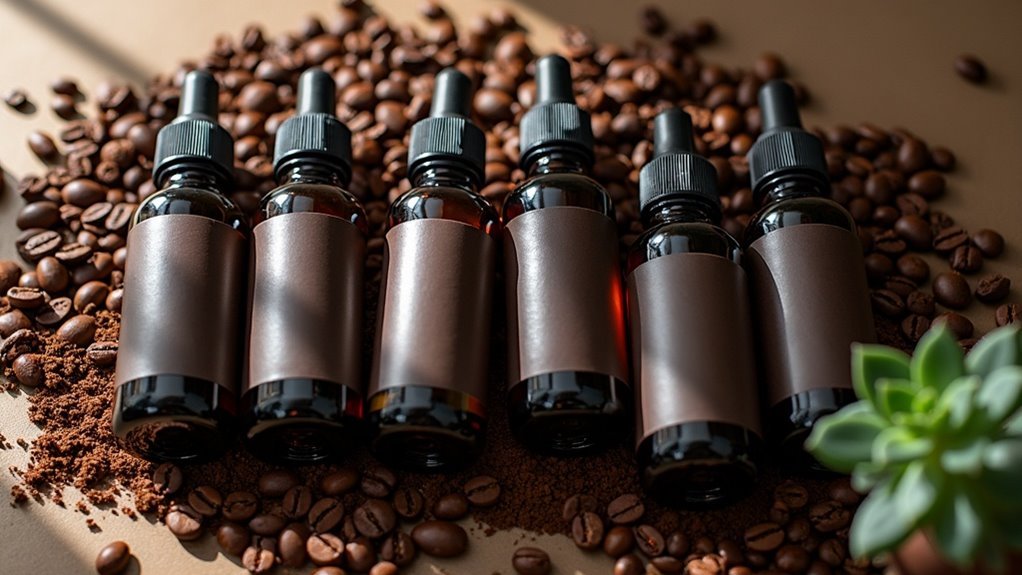Yes, coffee can affect cortisol levels. The caffeine in coffee stimulates the HPA axis, leading to cortisol spikes, especially if consumed on an empty stomach or during stressful times. To enjoy your coffee while minimizing cortisol increases, it’s best to drink it after breakfast, about 1-2 hours after waking. This aligns with your body’s natural rhythm. Additionally, staying hydrated and balancing your diet can help manage these cortisol spikes. Explore more on how to optimize your coffee intake and effectively manage stress.
Key Takeaways
- Caffeine in coffee activates the HPA axis, potentially elevating cortisol levels by about 50% after consumption.
- Drinking coffee on an empty stomach may intensify cortisol spikes and increase stress responses.
- For optimal enjoyment and to align with natural cortisol peaks, consider drinking coffee 1-2 hours after waking.
- Pairing your coffee with a nutritious breakfast can help stabilize cortisol levels and reduce any negative effects.
- Staying hydrated and exploring low-caffeine coffee options can mitigate coffee-induced cortisol increases and support your overall well-being.
Understanding Cortisol and Its Role in the Body
Cortisol, often referred to as the “stress hormone,” plays a significant role in your body’s response to various challenges, much like how coffee can affect your energy levels and alertness. Produced by your adrenal glands, cortisol regulates metabolism, blood pressure, and immune response, similar to the way caffeine in coffee stimulates your central nervous system.
Typically, cortisol levels peak in the morning, aligning with the time many people enjoy their first cup of coffee to feel alert and energized. When faced with physical or emotional stress, cortisol is released, activating your body’s “fight or flight” response, akin to the boost you might feel after a strong brew.
However, just as excessive coffee consumption can lead to jitters and anxiety, sustained elevated cortisol levels can result in serious health implications. Therefore, managing stress through balanced coffee intake, along with sleep, diet, and exercise, is vital for maintaining overall well-being and balanced cortisol levels.
How Caffeine Influences Cortisol Levels
When you sip on that morning cup of coffee, you mightn’t realize how caffeine is influencing your body’s cortisol levels.
Caffeine consumption from your favorite brew activates the hypothalamic-pituitary-adrenal (HPA) axis, potentially elevating cortisol levels by about 50% after just 80-120 mg of caffeine.
Caffeine can activate the HPA axis, increasing cortisol levels by 50% with just 80-120 mg intake.
While habitual coffee drinkers may develop a partial tolerance, the effects of caffeine can still lead to significant cortisol spikes, especially at higher doses.
These spikes can occur as soon as 15 minutes after enjoying your cup of joe and last up to 10 hours.
Notably, consuming coffee during low-stress periods may help mitigate these cortisol increases.
The Timing of Coffee Consumption and Cortisol Peaks
Timing your coffee consumption can greatly influence your overall well-being.
Having your first cup 1-2 hours after waking allows your body to stabilize its natural energy without triggering unnecessary cortisol spikes.
Plus, enjoying your coffee after breakfast can enhance your experience, as drinking it on an empty stomach may lead to discomfort, especially when cortisol levels are at their peak in the morning.
Optimal Morning Consumption Timing
To optimize your coffee consumption in the morning, it’s best to wait about 1-2 hours after waking. This timing aligns with your body’s natural cortisol peak, which typically occurs between 7 and 8 a.m.
Drinking coffee during this surge can heighten your cortisol response and stress levels. Instead, enjoy a glass of water and a balanced breakfast first to stabilize cortisol levels and mitigate digestive discomfort.
Avoid coffee on an empty stomach, as it can lead to increased stomach acid and discomfort. Following these health tips can enhance your overall well-being and make your coffee experience even more enjoyable.
Impact on Stress Levels
Coffee consumption right after waking can considerably impact your stress levels due to its interaction with cortisol peaks. When you drink coffee during the morning cortisol surge, it can elevate cortisol levels by about 50%.
To enjoy your coffee while managing stress more effectively, consider these tips:
- Wait 1-2 hours post-waking to savor your first cup
- Recognize your body’s natural energy patterns for optimal coffee enjoyment
- Avoid coffee during high-stress periods to prevent added anxiety
- Monitor your caffeine intake to maintain a healthy relationship with coffee
- Opt for coffee during calmer times for better cortisol management and a more enjoyable experience
Effects of Empty Stomach
When you consume coffee on an empty stomach, you might unknowingly intensify its effects on your cortisol levels, especially during peak times of the day.
Drinking coffee in the morning, particularly between 7 and 8 a.m., can amplify stress responses due to already elevated cortisol levels. The caffeine effects kick in quickly, often within just 15 minutes, and can linger for up to 10 hours, prolonging cortisol elevation.
This can lead to increased anxiety, irritability, and jitters. To enjoy your morning coffee while minimizing these negative effects, consider pairing it with a nutritious breakfast.
This can help stabilize cortisol levels and promote digestive comfort, allowing you to fully appreciate your cup of coffee.
Coffee vs. Other Caffeinated Beverages
A notable difference exists between coffee and other caffeinated beverages regarding their impact on cortisol levels.
Coffee consumption can lead to a staggering 50% rise in cortisol responses, while tea only increases levels by about 20%. Other caffeinated drinks, like energy drinks and sodas, fall in between, with a moderate 30% increase. This discrepancy largely stems from caffeine content, with coffee containing 80-120 mg per cup compared to tea’s 20-60 mg.
- Coffee boosts alertness significantly
- Energy drinks can spike stress levels
- Sodas provide quick bursts of energy
- Tolerance levels influence cortisol responses
Personalizing Your Caffeine Intake for Stress Management
Understanding how your body reacts to coffee is essential for effective stress management. Individual responses to coffee can vary widely, so it’s important to monitor your tolerance levels.
To minimize cortisol secretion, try enjoying your coffee during calm periods, rather than stressful ones. Waiting 1-2 hours after waking to indulge in your morning brew allows your body to utilize its natural energy first.
Consider personalized strategies like low-caffeine or decaffeinated coffee options to enjoy the rich flavors of coffee while reducing cortisol levels. Consulting a healthcare professional can provide tailored recommendations that align with your health and stress management goals, ensuring you make informed choices for your well-being while savoring your favorite drink.
Strategies to Mitigate Coffee-Induced Cortisol Spikes
To effectively manage coffee-induced cortisol spikes, consider implementing a few strategic habits.
These strategies can help you enjoy your coffee while balancing cortisol levels:
- Drink coffee 1-2 hours after waking to utilize natural energy first.
- Pair your coffee with a protein-rich breakfast for better balance.
- Opt for low-caffeine or decaf options to lessen cortisol increases.
- Enjoy coffee during calm periods instead of stressful situations.
- Stay hydrated with water alongside your coffee to counteract caffeine’s effects.
The Importance of a Balanced Diet Alongside Caffeine
To truly balance the effects of coffee, you need to focus on a nutrient-rich diet.
Incorporating foods like fruits, vegetables, and whole grains can help stabilize cortisol levels and enhance your overall well-being.
Timing your coffee intake alongside these healthy choices can further optimize your body’s response to stress.
Nutrient-Rich Foods
While caffeine can provide a quick energy boost, it’s essential to complement your coffee intake with nutrient-rich foods to help manage cortisol levels effectively. A balanced diet plays a vital role in counteracting caffeine’s stress-inducing effects.
Incorporate these nutrient-dense foods alongside your favorite coffee to stabilize cortisol:
- Fresh fruits and colorful vegetables
- Whole grains to keep you full and satisfied
- Omega-3 fatty acids, which can be found in fish and seeds
- Beans, nuts, and seeds to provide essential fiber
- A protein-packed breakfast that pairs well with your morning brew to mitigate stress effects
Avoid high sugar and saturated fats, as they can elevate cortisol levels.
Caffeine Timing Strategy
Understanding when to consume coffee can greatly impact your cortisol levels, especially when paired with a balanced diet.
Implementing a coffee timing strategy—like enjoying your morning brew 1-2 hours after waking—allows your body to leverage its natural cortisol peak, minimizing extra spikes. Complement this with a protein-packed meal to lessen the effects of coffee on cortisol.
Limiting coffee to earlier in the day, ideally before 3 p.m., not only promotes better sleep but keeps cortisol levels in check overnight. Incorporating omega-3 fatty acids and dietary fiber further stabilizes cortisol, enhancing your overall well-being alongside your coffee routine.








